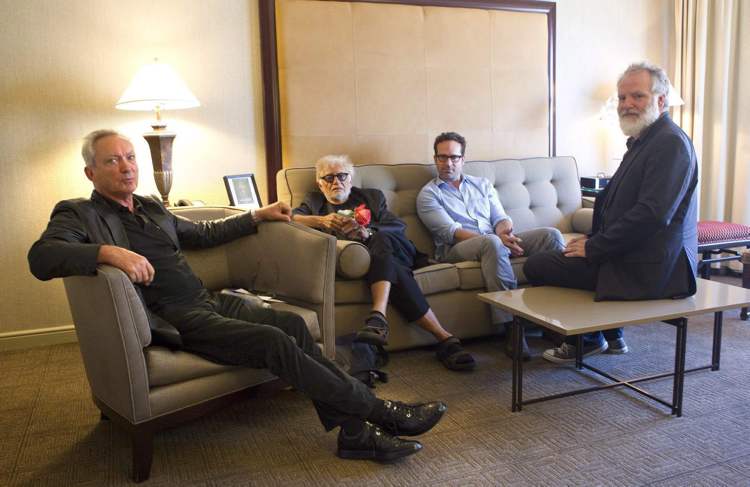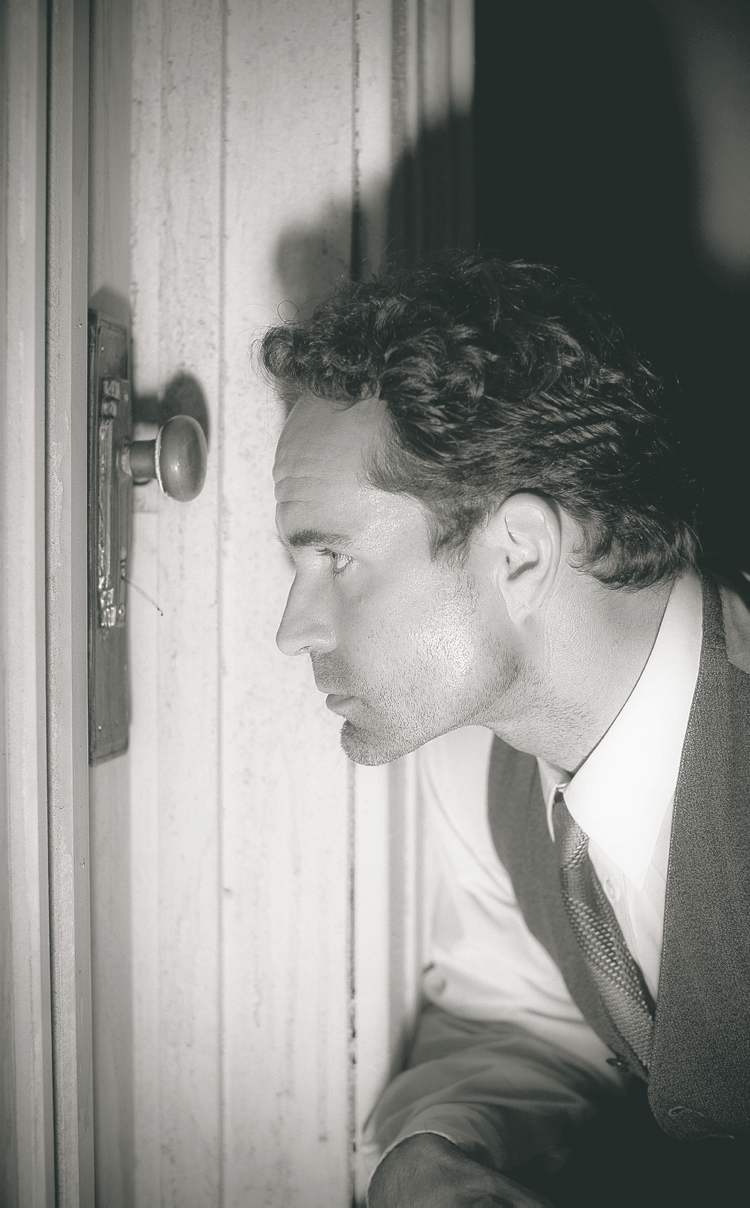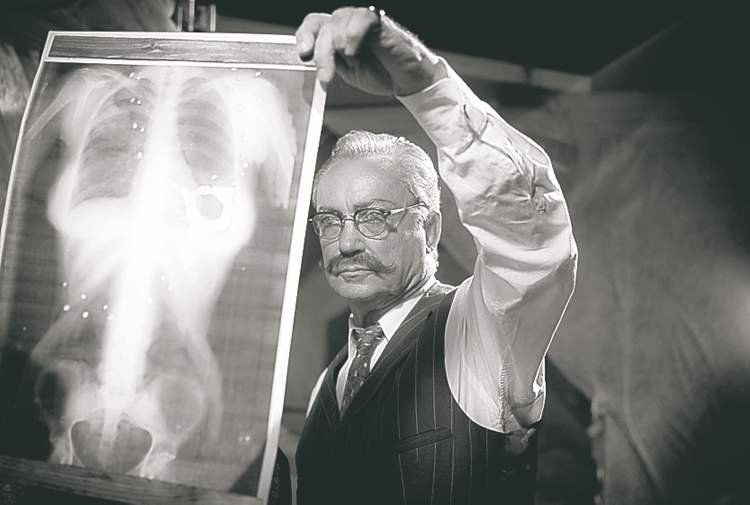Maddin’s odyssey
How the eccentric local director came to cast his most recognizable leading man
Advertisement
Read this article for free:
or
Already have an account? Log in here »
To continue reading, please subscribe:
Monthly Digital Subscription
$1 per week for 24 weeks*
- Enjoy unlimited reading on winnipegfreepress.com
- Read the E-Edition, our digital replica newspaper
- Access News Break, our award-winning app
- Play interactive puzzles
*Billed as $4.00 plus GST every four weeks. After 24 weeks, price increases to the regular rate of $19.00 plus GST every four weeks. Offer available to new and qualified returning subscribers only. Cancel any time.
Monthly Digital Subscription
$4.75/week*
- Enjoy unlimited reading on winnipegfreepress.com
- Read the E-Edition, our digital replica newspaper
- Access News Break, our award-winning app
- Play interactive puzzles
*Billed as $19 plus GST every four weeks. Cancel any time.
To continue reading, please subscribe:
Add Free Press access to your Brandon Sun subscription for only an additional
$1 for the first 4 weeks*
*Your next subscription payment will increase by $1.00 and you will be charged $16.99 plus GST for four weeks. After four weeks, your payment will increase to $23.99 plus GST every four weeks.
Read unlimited articles for free today:
or
Already have an account? Log in here »
Hey there, time traveller!
This article was published 14/04/2012 (4937 days ago), so information in it may no longer be current.
TORONTO — While the vast majority of his feature films have been shot in his native Winnipeg, filmmaker Guy Maddin has had lots of experience working with a host of recognizable “name” actors. Maddin’s eccentric resumé includes work with Frank Gorshin, Shelley Duvall and Alice Krige on Twilight of the Ice Nymphs and Isabella Rossellini, Mark McKinney and Maria de Medeiros on The Saddest Music in the World.
In a way, his new film Keyhole pairs him with his most recognizable leading man.

At last, Guy Maddin has something in common with Jan (Speed 2) de Bont. They have both worked with actor Jason Patric.
Coming from solid theatrical stock, (his father was playwright Jason Miller and his maternal grandfather was Jackie Gleason), Patric, 45, has made his share of big Hollywood fare, including the vampire thriller The Lost Boys, Barry Levinson’s fact-based New York crime story Sleepers, and the 2004 historical epic The Alamo.
But a perverse thread runs through Patric’s career. For every mainstream film he’s made, playing the heavy in the recent action movie The Losers, for example, it seems he’s made two interesting independent films, such as Your Friends and Neighbors (in the role of a caustically misogynist gynecologist) or the gritty bad-cop thriller Narc.
At the Toronto International Film Festival last September in a press roundtable that included Maddin, Patric, and co-stars Udo Kier and Louis Negin, Patric recalled meeting Maddin in 2005 at Ebertfest, a film festival devoted to overlooked films in which both Maddin and Patric had billing — Maddin for Saddest Music and Patric for the 1990 noir thriller After Dark, My Sweet in which he payed a brain-damaged ex-boxer.
“I really liked his film,” Patric recalls of seeing Maddin’s 2003 opus about a Depression-era contest to see which nation produced the saddest song. “And we just talked casually and I said, ‘Do you want to do something?”
For his part, Maddin was impressed by Patric’s blunt honesty about his work and career.
“You were just so frank and honest about your career and the decisions you made,” Maddin tells Patric. “It was really cool, and I was just won over, and of course the movie After Dark, My Sweet which I’d never seen before, was incredible.”
Maddin jokingly suggests Patric’s role in that film was the inspiration to cast him as the gangster hero Ulysses Pick in Keyhole, a dream-like take on The Odyssey in which Patric’s holed-up hoodlum must journey room by room to the boudoir of his estranged wife (Isabella Rosselini).
“I decided to start making a genre picture, a noir, but it ended up being this,” Maddin laughs. “I can never resist going baroque. So this is as close to noir as I’ll ever make, I guess.”
Patric isn’t complaining. Working on smaller films with directors such as Maddin “really brings you to your elemental self, which the movie making process today does not do.
“It’s so negative, it’s so corporate, so … dehumanizing. And I’m not just talking about the way movies are made but the lack of fraternity with the other actors and the backbiting.
“You’re all separate components (and you) show up for yourself. It’s unfortunate and really sad.”
The Maddin experience is much different.
“There’s no separation. Everything’s flying around. Everyone can do their own thing, and see each other and here’s this maestro, this conductor.”
Keyhole opens at the Globe Cinema next Friday, April 20.
randall.king@freepress.mb.ca
Handle with Kier
Given that most of Guy Maddin’s films look like they might have been made in Weimar-era Germany, it’s amazing that the director has never worked with actor Udo Kier before.

Even at the age of 67, the Cologne-born Kier has a disquietingly beautiful face, a quality that would have made him matinee idol material in the era when Marlene Dietrich was just starting out.
Of course, his film career took off in the ’70s, when it seemed Kier was the go-to guy when an actor was needed to portray varying degrees of perversity, including his elegant sexual sadist in The Story of O (1975) or his necrophile mad scientist in Andy Warhol’s Frankenstein (1973).
It turned out the key moment that led Kier to getting cast in Keyhole was a performance Maddin actually did not see.
“He narrated Brand Upon the Brain! in a performance I missed,” Maddin says, referring to his Seattle-shot 2006 film which was screened all over the U.S. with a series of actors and performers (including Eli Wallach, Laurie Anderson and Crispin Glover) providing live narration.
“I was told by Kyle McCulloch, my good friend in California, that I should consider killing myself for missing it because it was so amazing,” Maddin says. “After, Udo and I became friends over the phone and I fell in love with him.”
For Kier, Maddin falls into the same category of maverick film directors such as Lars von Trier.
“I like to work with directors where you feel they make the movies not for the audience, but make them for themselves,” Kier says. “They don’t care if it’s a success financially. That’s what I like. Lars (von Trier) never in his life made a film hoping that the audiences (would flock to it).”

In a way, Randall King was born into the entertainment beat.
Our newsroom depends on a growing audience of readers to power our journalism. If you are not a paid reader, please consider becoming a subscriber.
Our newsroom depends on its audience of readers to power our journalism. Thank you for your support.


